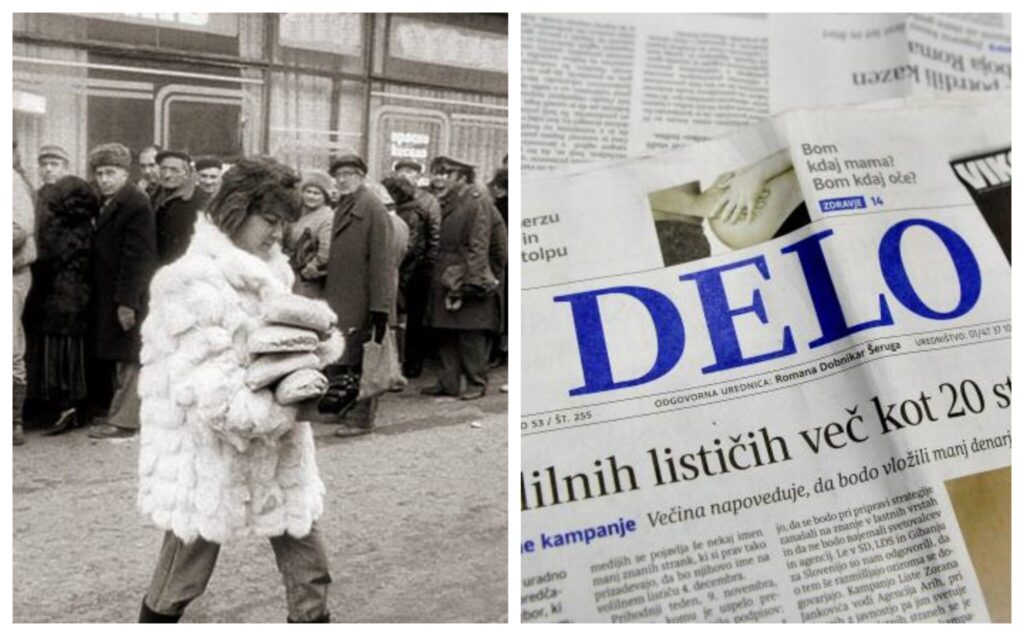The newspaper Delo has published a column by journalist Mojca Pišek, who regrets that at the time when Slovenians were deciding on the independence of our country, she was not old enough to be able to contribute her vote against it. Namely, she believes that we would be much better off if Slovenia developed its own autochthonous version of socialism. Many people who have experienced socialism first-hand cannot help but wonder whether Pišek is just another “victim” of the school system?
“If I had been old enough to vote in the plebiscite on Slovenian independence in 1990, I would have voted against. With the decision of the plebiscite, all of us, born too late, were robbed of the opportunity to grow up and live in a multicultural and multilingual country that would develop its own, autochthonous version of socialism instead of the wild capitalism. The plebiscite question was never precise and sincere,” she wrote in the introduction, adding that she believes the question should have read: “Do Slovenians want to shop in stores which will be just as colourful as the ones we drive to across the border?” She wonders whether Slovenians would once again decide for independence if they knew that capitalism, while filling up the shelves in stores, would also ravage their social ties and social security.
Some Yugo-nostalgics want to portray the former Yugoslavia as a kind of fairy-tale country by telling everyone how beautiful everything was in the time of socialism, what everything was like when there was no unemployment and young people got jobs right away, and how good life was in general – even though all of this is far from the truth. Since young people did not actually get to experience the Yugoslavian system first-hand, they are, of course, much more receptive to such stories. It is a fact that we were poorer in Yugoslavia than we are now. If it is completely normal for most people to be able to go to the store nowadays and buy some coffee, this was not always the case. One of the headlines in a newspaper from the times of Yugoslavia, for example, reads: “There is no coffee. But when we get a small shipment, this is how it is.” Since coffee is considered to be one of the most popular items, it is no wonder, of course, that coffee supplies ran out quickly, but people still huddled in lines, hoping to get it – even though the price had gone up significantly.
There was not enough gasoline
Far from it being about the lack of coffee during times of crisis. Due to the lack of gasoline, the state had to take extreme measures. One of these was undoubtedly the introduction of the even-odd system (on certain days, cars with odd registration numbers were not allowed to drive, and on other days, it was cars with even registration numbers). This was also followed by the introduction of petrol vouchers. Each driver was thus able to get a maximum of 40 litres of petrol per car in a given month. In addition to petrol, there was also a shortage of washing powder in shops, and there were also electric eclipses that happened due to the saving of energy.
When certain people try to sell us the story of success, they forget about many of the facts. After the 1960s, the Yugoslav public debt rose sharply. It grew (by about 17.6 percent every year since the 1960s) due to the helplessness of the Yugoslav economy, which was unable to service all of the public spending. It particularly grew in the 1970s, when it became completely clear that the socialist economy was based on a constant increase in external debt. Before the disintegration of Yugoslavia, the debt already amounted to as much as 20 billion dollars. If, for example, a debt of this size was nothing important for a capitalist country with a solid economy, it was something completely different in the case of Yugoslavia, which had an uncompetitive socialist economy. The US aid to Yugoslavia was one of the reasons why the Yugoslav economy, despite its unproductiveness, managed to last as long as it did.
When people talk about how there was never a lack of jobs in Yugoslavia, they often forget to mention that this was the case due to the expulsion of the Yugoslav labour force. Let’s think back to how it was. In the mid-1960s, almost simultaneously with the onset of rising of public debt, unemployment also began to rise. When it reached more than seven percent, the doors of the Yugoslav borders opened. By 1973, almost 700 thousand Yugoslavs had gone to work abroad, mainly to West Germany and Austria, and then another million in the following years.
Given that the columnist Pišek wants so badly for things to be the way they used to be, one cannot help but wonder if, for example, she herself would be willing to drive to a different country if she urgently needed some jeans. At the time of Yugoslavia, you had to go abroad in order to buy an ordinary pair of jeans, mayonnaise, bananas, and, of course, coffee. Obviously, some people do not bother reading through any additional sources, which could help them see a more complete picture of our recent history. If they did do that, they would probably change their minds again. Not everything only has one side.
Sara Kovač


